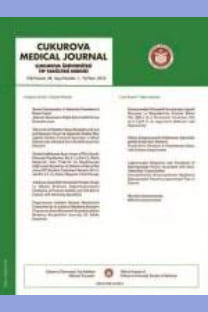Diyarbakır ilinde çok eşliliğin aile üyeleri üzerindeki olumsuz etkileri
Polygamy, Monogamy, Marriage, Sociodemographic features, mental health disorders
Negative effects of polygamy on family members in the province of Diyarbakir, Turkey
Polygamy, Monogamy, Marriage, Sociodemographic features,
___
- 1. Zeitzen MK. Polygamy: A Cross-cultural Analysis. New York, USA, Berg Publishers, 2008.
- 2. Ozkan M, Altindag A, Oto R, Sentunali E. Mental health aspects of Turkish women from polygamous versus monogamous families. Int J Soc Psychiatry. 2006;52:214-20.
- 3. Yılmaz E, Tamam L, Bal U. Poligami ve ruh sağlığına etkileri. Psikiyatride Güncel Yaklaşımlar. 2015;7:221-8.
- 4. Chaleby K. Women of polygamous marriages in inpatient psychiatric service in Kuwait. J Nerv Ment Dis. 1985;173:56-8.
- 5. Turgut M, Feyzioglu S. Türkiye Aile Yapısı Araştırması Tespitler Öneriler. İstanbul, Aile ve Sosyal Politikalar Bakanlığı, 2014.
- 6. Gücük S, Arıca SG, Akan Z, Arıca V, Alkan S. Van ilindeki çok eşlilik oranları ve etkileyen faktörler: kesitsel çalışma. J Kartal TR. 2010;21:127-33.
- 7. Al-Krenawi A. Mental health and polygamy: The Syrian case. World J Psychiatry. 2013;3:1-7.
- 8. Al-Sharfi M, Pfeffer K, Miller KA. The effects of polygamy on children and adolescents: A systematic review. J Fam Stud. 2016;22:272-286.
- 9. State Institute of Statistics of Turkey. Marriage by age group, 1970–1999. Ankara, State Institute of Statistics of Turkey, 1999.
- 10. T.C. Başbakanlık Aile ve Sosyal Araştırmalar Genel Mudurlugu. Turkiye’de Aile Yapısı Araştırması. Ankara, Afşaroğlu Matbaası, 2011.
- 11. Al-Krenawi A, Graham JR. A comparison of family functioning, life and marital satisfaction, and mental health of women in polygamous and monogamous marriages. Int J Soc Psychiatry. 2006;52:5-17.
- 12. Chamie J. Polygyny among Arabs. Popul Stud (Camb). 1986;40:55-66.
- 13. Rubin A, Babbie ER. Research Methods for Social Work. London: Cengage Learning. 2009.
- 14. First MB, Spitzer RL, Gibbon M, Williams JBW. Structured Clinical Interview for DSM-IV Axis I Disorders (SCID). New York, New York State Psychiatric Institute Biometrics Research. 1995.
- 15. Derogatis LR, Cleary PA. Confirmation of the dimensional structure of the SCL-90: A study in construct validation. J Clin Psychol. 1977;33:981–9.
- 16. Al-Krenawi A, Graham JR, Al Gharaibeh F. A comparison study of psychological, family function marital and life satisfactions of polygamous and monogamous women in Jordan. Community Ment Health J. 2011;47:594-602.
- 17. Rivett M, Street E. Informal polygamy-a suitable case for treatment. J Fam Ther. 1993;15:71-9.
- 18. Nurrohmah L. Poligamy: saatnya membaca realita. Jurnal Perempuan. 2003;31:33-45.
- 19. Meekers D, Franklin N. Womens perceptions of polygyny among the Kaguru of Tanzania. Ethnology. 1995;34:315-29.
- 20. Al-Krenawi A, Graham J, Izzeldin A. The psychosocial impact of polygamous marriages on Palestinian women. Women Health. 2001;34:1-16.
- 21. Özer A, Orhan FÖ, Ekerbicer HÇ. Sociodemographic variables and depression in Turkish women from polygamous versus monogamous families. Health Care Women Int. 2013;34:1024-34.
- 22. Esmaili, G, Sadrpushan N, Gorji Y. Comparison for quality of life for men in monogamy and in polygamy families. Journal of Sociological Research. 2012;3:428-39.
- 23. Chaleby K. Traditional Arabian marriages and mental-health in a group of outpatient Saudis. Acta Psychiatr Scand. 1988;77:139-42.
- 24. El-Islam MF. Culture bound neurosis in Qatari women. Soc Psychiatry. 1975;10:25-9.
- 25. Al-Krenawi A, Graham JR, Al-Krenawi S. Social work practice with polygamous families. Child Adolesc Social Work J. 1997;14:445-58.
- 26. Hassouneh-Phillips D. American Muslim women's experiences of leaving abusive relationships. Health Care Women Int. 2001;22:415-32.
- 27. Al-Krenawi A, Lev-Wiesel R. Wife abuse among polygamous and monogamous Bedouin-Arab families. J Divorce Remarriage. 2002;36:151-8.
- 28. Al-Issa I. Culture and mental illness in Algeria. Int J Soc Psychiatry. 1990;36:230-40.
- 29. Al-Krenawi A. A study of psychological symptoms, family function, marital and life satisfactions of polygamous and monogamous women: The Palestinian case. Int J Soc Psychiatry. 2012;58:79-86.
- 30. Broude GJ. Marriage, Family and Relationships: A Cross-Cultural Encyclopedia. Denver, CO, ABC-CLIO, 1994.
- ISSN: 2602-3032
- Yayın Aralığı: Yılda 4 Sayı
- Başlangıç: 1976
- Yayıncı: Çukurova Üniversitesi Tıp Fakültesi
Sedasyon altında dental tedavi alan epidermolizis büllozalı hastada anestezi
Afaki tedavisinde üç parçalı göziçi lensin sütürsüz intraskleral fiksasyonu
Hülya CENK, Gülbahar SARAÇ, Nurhan ŞAHİN
Hastaların hizmet kalitesinden memnuniyetleri: güvenlik hissinin arabulucu rolü
Farideh ROSTAMİ, Ghasem ABEDİ, Aliasghar NADİ, Ehsan ABEDİNİ, Kamyar MANSORİ
Testisin büyük hücreli kalsifiye sertoli hücreli tümörü
Emine KILIÇ BAĞIR, Arbil AÇIKALIN, Elif ÇALIŞ, Şeyda ERDOĞAN
Motosiklet kazası sonrası izole hyoid kemik kırığı
İbrahim TOKER, Turgay Yılmaz KILIÇ, Yeşim EYLER, Necmiye YALÇIN OCAK, Serkan HACAR, Güllü AKBAYDOĞAN DÜNDAR
M. Bertan YILMAZ, Erdal TUNÇ, N. Seda ILGAZ, Hale ÖKSÜZ, Ezgi ÖZTECİK, Lütfiye ÖZPAK, İşıl ÖCAL, Ayfer PAZARBAŞI, Osman DEMİRHAN
Çocukluk çağında orbital teratom zemininde gelişen malign gliom
Konjenital midaortik sendromlu bir bebek
Hacer YAPICIOĞLU YILDIZDAŞ, Sevcan ERDEM, Fadli DEMİR, Hüseyin ŞİMŞEK, Ferda ÖZLÜ
Aquaporin 2 mutasyonu saptanan konjenital nefrojenik diabetes insipiduslu bir ol
